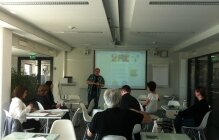incluD-ed’s first field visit in Helsinki, Finland (3/3)
Fri, 04/07/2014
- Field visit to the CIMO
The third meeting led the incluD-ed members to meet with CIMO, an independent agency that collaborates with the Ministry of Education. CIMO’s main mission is to promote international cooperation and mobility in areas such as education, training, employment, culture and youth. To this end, the CIMO implement various exchange, trainee and scholarship programmes.
The CIMO team lead by Mr Mauri Uusilehto (Programme Manager, EU Youth in Action and Europe for Citizens Programme) shared his experience presenting former and current initiatives focused on people with disabilities. They had prepared several presentations for the incluD-ed network partners: Ms Sini Piippo (Senior Programme Adviser, Higher Education Cooperation Unit) spoke about “Equal Opportunities of Internalization in Education/Inclusion in Higher Education” and showed a video (https://www.youtube.com/watch?v=uuhIP-0AjKg) on NORTH-SOUTH-SOUTH Higher Education Institution Network Programme (http://www.cimo.fi/services/publications/north-south-south). Ms Jutta Kivimäki (Senior Programme Adviser, Youth and Culture Unit) spoke about “Inclusion in Erasmus+ and Youth in Action” and Ms Sari Huttunen (Senior Programme Adviser, Vocational Education and Training Unit) on “Inclusion in Vocational Education Programmes”.
They told incluD-ed that CIMO has its own ‘Strategy 2020’ with the aim to promote equal opportunities, participate in international cooperation, and actively fight inequality. To achieve this, they founded an internal working group in 2011 that aims to promote accessible international mobility in higher education.
CIMO offers accessibility grants to special educational needs 's (SEN) students that want to go abroad in order to foster their participation in international and EU mobility programmes. Special needs support for international mobility generally includes an assistant (fee, travelling, accommodation, meals), all the travelling and accommodation related to special needs as well as all measures and / or equipment that promote accessibility. Furthermore, the CIMO offers to finance an advance planning visit and to provide reinforced mentorship.
The following mobilities have been achieved by the CIMO in the last years:
•2011-2012 - 3 for student mobility
•2012-2013 - 3 for student mobility and practical training
•2013-2014 - 8 for student mobility and 1 for staff mobility
During their presentation incluD-ed identified a lot of good practices, such as the checklist “Accessibility and International Student Mobility - Checklist for Exchange Students and Higher Education Institutions” that will be soon published on the incluD-ed website.
***
Conclusion and lessons learnt by the incluD-ed network
The three visits were very interesting for the incluD-ed network partners. The Network Secretariat asked them at the 5th network meeting which ideas seem to be very specific to the Finnish education system? The following were highlighted by the partners:
- Education is at the centre of society and economy.
- Importance of teachers’ involvement (a highly valued profession).
- Inclusion needs to be taken care of, as high levels of education do not necessarily guarantee high levels of inclusive education.
incluD-ed considers its first field visits as very valuable experiences to understand the education system in Finland and the Finnish approach to inclusive education.
***
incluD-ed’s first field visit in Helsinki, Finland (1/3)
incluD-ed’s first field visit in Helsinki, Finland (2/3)
incluD-ed’s first field visit in Helsinki, Finland (3/3)


















